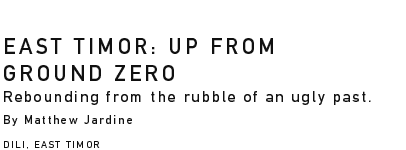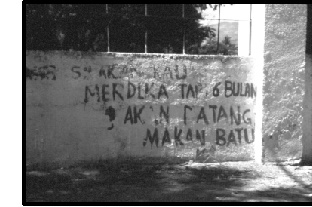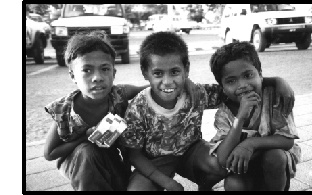 
|

|

|

|
| |
 |
|||||
|
Dili, East Timor Do you have any photos of my husband?" Senhora Quintas asks me upon learning that I had met her husband, pro-independence leader Verissimo Quintas, during a 1992 visit to East Timor. Unfortunately, I did not have any photos, nor did she. On August 28, 1999, less than a day and a half before the start of a U.N.-run referendum, in which East Timor's citizens voted overwhelmingly in favor of independence, armed Indonesian soldiers surrounded her home in the town of Lospalos and opened fire. Then, before burning down the house, members of the local militia rushed inside and hacked to death Verissimo with machetes. Countless East Timorese have similar stories. Indonesia's 1975 invasion and
The U.N. Transitional Authority in East Timor (UNTAET) now governs the territory, helping to rebuild the country and to prepare it for independence. Undoubtedly, UNTAET and the international community have made big strides here: The majority of East Timorese forced into Indonesia in September 1999 have returned home; the electrical system is working again in most major towns; tens of thousands of people have received emergency food aid; a national health care system is now functioning; and the vast majority of East Timorese youth are back in school. These successes are all the more impressive given that, in the wake of the final terror campaign, the country lacked phone and electrical systems and had no administrative apparatus after Indonesian authorities departed. Yet the majority of people in East Timor often cannot meet their most basic needs. Thirty-five percent of the population suffers from food insecurity, according to a report by the U.N. Food and Agriculture Organization, and an estimated 80 percent of the population remains unemployed. And while the U.N.-led international peacekeeping force has largely eliminated the immediate security threat of the Indonesian military and its militia forces, these groups continue to hold much of the population hostage--psychologically as well as physically. Jose, a cab driver in Dili, cries as he tells me how his family was forced into to Indonesian West Timor after the independence vote. Many of them are still there, along with approximately 120,000 other East Timorese held in camps controlled by the militias. Meanwhile, according to the United Nations, several dozen militia groups crossed the border in mid-August, causing many East Timorese villagers to flee into the forest. Militia members also have repeatedly assaulted U.N. humanitarian workers while Indonesian soldiers stood by. In a particularly horrific incident, machete-wielding militia members attacked a U.N. office in Atambua, West Timor on September 6, hacking to death three foreign U.N. workers and then burning their bodies. Over the past few months, military forces crossing from West Timor have fired on U.N. peacekeeping troops on numerous occasions, killing one and wounding two others. The United Nations describes the assailants as "militia," but at least some of the attackers were elite military troops, according to one U.N. official who read the confidential intelligence report on the killing of a New Zealand soldier in July. "Hello Mister" is how East Timorese frequently greet foreigners. It is also now the
Probably the most blatant manifestation of this phenomenon is the Hotel Olympia, a giant floating hotel in the harbor across the street from UNTAET's headquarters. With rooms costing more than $160 per night, the United Nations has pumped millions of dollars into the foreign-owned venture to put up members of its international staff, rather than using the money to rebuild one of East Timor's destroyed hotels. Indeed, UNTAET has no policy to favor East Timorese producers and service providers. At the same time, in the name of preventing inflation in the local economy, UNTAET pays its East Timorese staff an average of $5 a day, while international staff receive New York-level salaries in addition to a daily living allowance of more than $100. Not surprisingly, a certain level of resentment toward expats has developed among many East Timorese. "There's no shortage of cold beer for sale," complains Francisco, a Protestant minister, "but there is a shortage of affordable construction materials so people can rebuild their houses." Even Mary Robinson, the U.N. Commissioner for Human Rights, criticized the international community in East Timor during a recent visit to the territory. "There is not that empathy of really understanding how much the people of East Timor suffered," she said. While this is a generalization, there undoubtedly is a certain arrogance toward the East Timorese on the part of U.N. officials, who have excluded locals from the UNTAET decision-making process. In June, East Timorese Nobel Peace Prize recipient José Ramos-Horta called for all UNTAET district administrators, who essentially serve as governors of the territory's 13 districts, to be replaced by East Timorese. Even in small towns, UNTAET's local administrators are people from places such as Norway, Uganda and Sri Lanka. To its credit, UNTAET has announced plans to appoint locals as deputy district administrators and, gradually, as district administrators to take over from international officials. And more recently, UNTAET has created a cabinet in which East Timorese occupy four of the eight positions. Nonetheless, the international staff still calls the shots. Indeed, by making UNTAET a governing mission rather than an assistance mission, the international community has disempowered the East Timorese and further undermined the territory's long-term prospects. The most obvious example of this institutionalized arrogance is the U.N. treatment of FALINTIL, the East Timorese guerrilla army that played a heroic role in liberating the country. FALINTIL is, in some respects, far better equipped to patrol the territory than peacekeepers who have little knowledge of the terrain and are unable to communicate with the local population. Yet rather than allowing FALINTIL to spread throughout the country and to work alongside the international peacekeepers, the United Nations confined it to the town of Aileu. Only in late August, in the face of the peacekeepers' inability to stop increasing militia and military incursions from West Timor, did UNTAET allow 67 FALINTIL members to work alongside the international force. Nevertheless, East Timor is progressing toward full independence. An election for some sort of constitutional assembly is tentatively planned for late 2001. This should lead to a formal transfer of power to an East Timorese government by the end of next year. Many of East Timor's political leaders hope to develop off-shore oil and natural gas deposits, increase production of the territory's high-quality organic coffee (a crop whose value is notoriously volatile in the international market), and establish a successful tourism industry to provide a strong economic base for the country. But it is doubtful the post-independence government will be able to meet the basic needs of its population given the destruction and trauma the territory has suffered and the insufficient resources provided to rebuild. Indeed, representatives of the international community seem resigned to what they see as the inevitable future poverty of the country. As an Australian official in Dili explains, "This is going to be a very poor country for a very long time, and we cannot build what the East Timorese cannot then afford to run." The international community is letting such fatalistic assumptions guide its work in
While the Indonesian military and the political elites behind it are most directly responsible, the destruction of East Timor couldn't have happened without the complicity of the world's powerful, most notably the United States. From December 1975 through mid-September 1999, Washington gave billions in economic assistance, sold more than a billion dollars worth of weaponry, and provided significant military training and aid to Jakarta. And Washington prevented the United Nations from taking any meaningful steps to enforce its resolutions demanding that Indonesia withdraw from East Timor. It was not until September 1999, in the face of strong congressional and grassroots pressure, that the Clinton administration cut military ties and suspended assistance to Jakarta. It is for such reasons that dozens of East Timorese gathered in front of the local U.S. diplomatic mission on July 4. Calling themselves the 1975-1999 Alliance for Justice, the demonstrators made five demands of Washington: the release of all U.S. government documents relating to East Timor; the establishment of an independent commission to investigate and publicize American complicity with Indonesia's crimes in the territory; an official apology for the U.S. role; U.S. reparations to the people of East Timor; and active support for an international tribunal to investigate and prosecute war crimes and crimes against humanity committed in East Timor from 1975 to 1999. In response, W. Gary Gray, the principal U.S. diplomat in Dili, opined that "it's better to concentrate on the future than rehash the past." But it is exactly the past that East Timor and those that are responsible--directly and indirectly--for the country's destruction must deal with to ensure that the former Portuguese colony and its people can recover from its recent history. Efforts to bring those parties to justice have been woefully inadequate. The U.N. International Commission of Inquiry on East Timor called for the establishment of an ad-hoc international human rights tribunal in late January, but the United States and its allies on the U.N. Security Council instead acceded to Jakarta's demands that Indonesia have the chance to prosecute the accused prior to any decision to proceed internationally. More than six months since the Security Council called upon Jakarta to bring those responsible for last year's violence to justice "as soon as possible," there has been little progress. In mid-August, Indonesia's parliament passed a constitutional amendment prohibiting prosecution for crimes that did not constitute an offense at the time of their commission. In other words, the amendment effectively disallows the prosecution of individuals for war crimes or crimes against humanity committed in East Timor or Indonesia before now, because such crimes were not defined in Indonesian law. While Jakarta's stonewalling may invigorate efforts to establish an international tribunal, the U.N. plan, even if implemented, would still fall far short of what is needed. Most egregiously, there is no provision to investigate and prosecute war crimes and crimes against humanity committed in East Timor prior to 1999. And although UNTAET has begun establishing courts in East Timor that could potentially try those accused of such crimes, the courts only have jurisdiction within the territory--while almost all of the key players involved in the terror are outside the country, mostly in Indonesia. The Clinton administration has made some strong statements calling upon Jakarta to establish a credible and transparent process to prosecute Indonesian citizens charged with gross human rights abuses in East Timor, and has threatened to support the establishment of an ad-hoc international tribunal if Jakarta does not do so. But the administration's vision of such a tribunal would only cover war crimes and crimes against humanity committed by Indonesia in East Timor from January 1 to October 25, 1999, when international troops entered the territory. It's easy to become depressed about the future prospects of East Timor. But it's also important to recognize the dynamism and creativity of the country's myriad activist groups and political movements as well as the strong international solidarity movement that supports them. Most importantly, we must remember how far East Timor has come in such a short time. Within the last year, the country has emerged from one of the most oppressive and brutal occupations in recent history. As many East Timorese told me, they may not have a house or a job, but at least they can talk freely and walk down the street without fear. The importance of this new reality was evident when I visited Ana Lopes at the ruins of her family home in the most devastated neighborhood of Dili. Unlike a year ago, when militia regularly terrorized her family, she did not cry when she spoke to me. She now talks in a voice louder than a faint whisper, and no longer nervously rocks back and forth in her chair during an interview. When I left, she walked me out of the house onto the street--something
she never did during my many visits last year due to the fear of
enraging the militia types who stalked the neighborhood. Perhaps
most moving was when Ana proudly showed me the corn she is growing
in a garden across the street from her house, amidst the ruins of
the militia post--a beautiful symbol of the new order growing from
the rubble of a very ugly past. Matthew Jardine recently returned from three months in East Timor. He is the author of East Timor: Genocide in Paradise (Odonian Press and Common Courage Press) and the co-author of East Timor's Unfinished Struggle: Inside the Timorese Resistance (South End Press).
|



